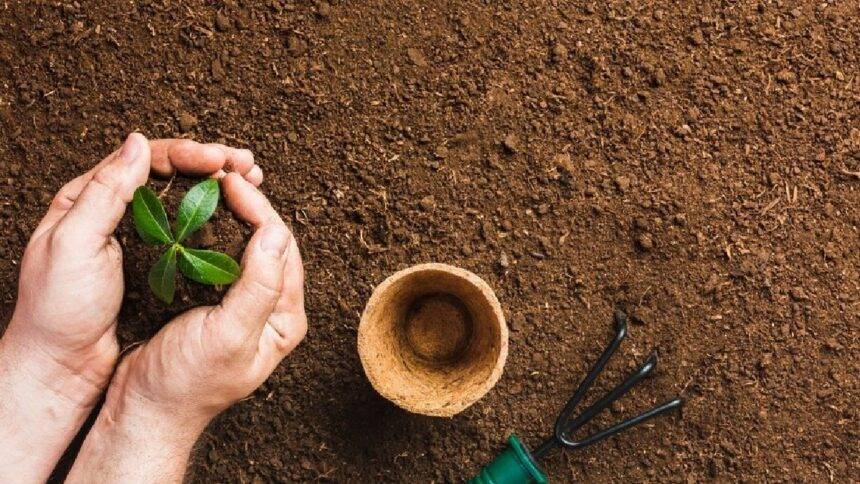Main Points In Hindi (मुख्य बातें – हिंदी में)
यहाँ दिए गए पाठ के मुख्य बिंदु निम्नलिखित हैं:
-
मिट्टी की स्थिति: देश के 30 प्रतिशत मिट्टी में गिरावट आई है, जो फसल उत्पादन को प्रभावित कर सकता है। मिट्टी में कमी और फसल उत्पादन में सुधार के लिए किसान उपायों की जरूरत है।
-
मिट्टी परीक्षण प्रयोगशालाएँ बढ़ाने की आवश्यकता: केंद्रीय सरकार किसानों की सुविधा के लिए गांव स्तर पर मिट्टी परीक्षण प्रयोगशालाओं की संख्या बढ़ाने पर विचार कर रही है, ताकि किसान अपने खेतों की मिट्टी की जांच अपने गांव में कर सकें।
-
समय पर बोआई का महत्व: कृषि विशेषज्ञों का मानना है कि मिट्टी की गुणवत्ता में कमी को दूर करने के लिए सही समय पर बोआई करना महत्वपूर्ण है। किसानों को मिट्टी स्वास्थ्य कार्ड के माध्यम से प्राप्त जानकारी के अनुसार उर्वरकों का उपयोग करने की आवश्यकता है।
-
सरकारी पहलों की जानकारी: केंद्रीय कृषि मंत्री ने मिट्टी की स्थिति की चिंता के प्रति जागरूकता बढ़ाने के लिए कई पहलों की बात की है। इस संबंध में, मिट्टी स्वास्थ्य प्रबंधन और मिट्टी स्वास्थ्य कार्ड योजनाओं का विस्तार किया जा सकता है।
- आर्थिक संकट की चेतावनी: मिट्टी की गुणवत्ता में गिरावट से न केवल फसलों का उत्पादन प्रभावित होता है, बल्कि यह किसानों के लिए आजीविका और भोजन संकट उत्पन्न कर सकता है, इसलिए इस पर गंभीरता से ध्यान देने की आवश्यकता है।
Main Points In English(मुख्य बातें – अंग्रेज़ी में)
Here are the main points regarding the state of soil health and agricultural practices in the country:


-
Soil Degradation: Approximately 30% of the country’s soil is reportedly degraded, which significantly impacts crop production. Factors contributing to this include soil erosion, salinity, pollution, and a lack of organic carbon, leading to decreased fertility and resilience.
-
Importance of Field Preparation and Timely Sowing: Agricultural scientists emphasize the necessity for farmers to prepare their fields adequately before sowing crops. Timely sowing is essential to counteract the challenges posed by declining soil fertility.
-
Soil Testing Labs Expansion: The central government is considering increasing the number of soil testing labs to provide farmers with easier access to soil health assessments. Currently, there are 6,665 labs across the country, with plans to increase this number to over 10,000, particularly at the village level.
-
Government Initiatives: The Union Minister highlighted various initiatives taken by the government to address soil health issues and ensure food security for farmers. This includes the expansion of the Soil Health Management and Soil Health Card schemes.
- Benefits of Increased Soil Testing: Experts believe that expanding the number of soil testing labs would greatly benefit the agricultural sector by providing farmers with valuable information about their soil health, enabling them to make informed decisions regarding fertilizers and crop management.
Complete News In Hindi(पूरी खबर – हिंदी में)
देश की मिट्टी का 30 प्रतिशत हिस्सा खराब हो चुका है, जिससे फसल उत्पादन पर प्रभाव पड़ सकता है। कृषि वैज्ञानिक मानते हैं कि किसानों के लिए बीज बोने से पहले खेतों की सही तैयारी करना जरूरी है। मिट्टी की उर्वरता में कमी की चुनौती को देखते हुए, समय पर फसल बुवाई करना महत्वपूर्ण हो सकता है। साथ ही, केंद्र सरकार किसानों के लिए खेतों की मिट्टी की जांच के लिए प्रयोगशालाएं बढ़ाने का निर्णय ले सकती है। इन प्रयोगशालाओं की संख्या गाँव स्तर पर भी बढ़ाई जा सकती है। इसके अलावा, मिट्टी की उर्वरता सुधारने के लिए आने वाले दिनों में कई बड़े निर्णय देखने को मिल सकते हैं।
केंद्रीय मंत्री शिवराज सिंह चौहान ने 19 नवंबर को नई दिल्ली के पुसा में Global Soil Conference 2024 में कहा कि कई अध्ययनों के अनुसार, हमारे देश की 30 प्रतिशत मिट्टी खराब हो चुकी है। मिट्टी का कटाव, लामनता, और प्रदूषण मिट्टी में आवश्यक नाइट्रोजन और माइक्रोन्यूट्रिएंट्स के स्तर को कम कर रहे हैं। मिट्टी में कार्बनिक कार्बन की कमी ने इसकी उर्वरता और लचीलापन को कमजोर कर दिया है। ये चुनौतियाँ न केवल उत्पादन को प्रभावित करेंगी, बल्कि भविष्य में किसानों के लिए आजीविका और खाद्य संकट भी उत्पन्न करेंगी, इसलिए इसे गंभीरता से लेना महत्वपूर्ण है। हमारी सरकार ने इसके लिए कई कदम उठाए हैं।
कहाँ और कितनी मिट्टी परीक्षण प्रयोगशालाएँ हैं
खराब होती मिट्टी के आंकड़ों ने चिंताओं को बढ़ा दिया है। कहा जा रहा है कि मिट्टी सुधार के दिशा में, केंद्र सरकार देश भर में मिट्टी परीक्षण प्रयोगशालाओं की संख्या बढ़ा सकती है। मिट्टी स्वास्थ्य प्रबंधन और मिट्टी स्वास्थ्य कार्ड योजनाओं को और बढ़ाया जा सकता है। दिसंबर 2023 के आंकड़ों के अनुसार, केंद्रीय कृषि और किसान कल्याण मंत्रालय के पास देश भर में खेतों के मिट्टी परीक्षण के लिए 665 मिट्टी परीक्षण प्रयोगशालाएँ हैं। इनमें से सबसे अधिक 291 प्रयोगशालाएँ कर्नाटक में हैं। इसके बाद नागालैंड में 74 और बिहार में 72 प्रयोगशालाएँ हैं। साथ ही, तेलंगाना में 2050 सबसे अधिक मिनी प्रयोगशालाएँ हैं। इसके बाद आंध्र प्रदेश में 1328 और झारखंड में 1300 मिनी मिट्टी परीक्षण प्रयोगशालाएँ हैं। वहीं, महाराष्ट्र में 213 राज्य स्तर की स्थिर प्रयोगशालाएँ हैं।
मिट्टी परीक्षण प्रयोगशालाओं के निर्णय का इंतजार
देश भर में मिट्टी परीक्षण प्रयोगशालाओं की कुल संख्या 8272 है। इसे 10,000 से अधिक करने की तैयारी है। अधिकतम संख्या प्रयोगशालाओं की गाँव स्तर पर बढ़ाई जा सकती है। ताकि किसानों को मिट्टी परीक्षण के लिए ज़िला मुख्यालय या कृषि विभाग के केंद्र पर न जाना पड़े। उन्हें अपने गाँव में ही मिट्टी परीक्षण की सुविधा मिल सके। मिट्टी परीक्षण प्रयोगशालाओं की संख्या बढ़ाने के बारे में अभी तक कोई आधिकारिक घोषणा नहीं की गई है, लेकिन कृषि मंत्री की चिंताओं को देखते हुए, माना जा रहा है कि जल्द ही इस पर निर्णय लिया जा सकता है।
मिट्टी परीक्षण प्रयोगशालाओं की संख्या बढ़ाना एक अच्छा कदम होगा
भारतीय मिट्टी और जल संरक्षण संस्थान (ICAR-IISWC) के प्रधान वैज्ञानिक, एम. मुरुगानंदम ने मिट्टी की deteriorating स्थिति पर चिंता जताई है। उन्होंने कहा कि प्रयोगशालाओं की संख्या बढ़ाई जानी चाहिए। ऐसा करना एक अच्छा कदम होगा। हालांकि, उन्हें इस निर्णय के बारे में कोई जानकारी नहीं है। उन्होंने कहा कि यदि सरकार मिट्टी परीक्षण प्रयोगशालाओं की संख्या बढ़ाने का निर्णय लेती है, तो यह कृषि क्षेत्र के लिए बहुत फायदेमंद हो सकता है। इससे किसानों को मिट्टी की स्वास्थ्य जानकारी प्राप्त करना आसान होगा।
उच्च उपज के लिए समय पर बुवाई आवश्यक है
प्रधान वैज्ञानिक एम. मुरुगानंदम ने कहा कि मिट्टी की उर्वरता में कमी के कारण फसल उत्पादन प्रभावित होता है। उन्होंने कहा कि वर्तमान चुनौतियों को देखते हुए, किसानों के लिए फसल बोने से पहले अच्छे से खेतों की तैयारी करना जरूरी है। वहीं, समय पर बुवाई करना मिट्टी की उर्वरता में कमी की चुनौती से निपटने में महत्वपूर्ण हो सकता है। इसके साथ ही, किसानों को मिट्टी स्वास्थ्य कार्ड के माध्यम से मिली जानकारी के अनुसार उर्वरकों का उपयोग करना चाहिए।
ये भी पढ़ें –
Complete News In English(पूरी खबर – अंग्रेज़ी में)
30 percent of the country’s soil has been spoiled, which can affect crop production. Agricultural scientists believe that it is important for farmers to prepare the fields well before sowing. Whereas, considering the challenge of declining soil fertility, timely sowing can prove to play an important role. At the same time, the central government can take a decision to increase soil testing lab for farmers to test the soil of their fields. The number of labs can be increased at the village level also. Whereas, as part of efforts to improve soil fertility, many more big decisions can be seen in the coming days.
Union Minister Shivraj Singh Chauhan said on November 19 at the Global Soil Conference 2024 in Pusa, New Delhi that according to many studies, 30 percent of our soil has been degraded. Soil erosion, salinity, pollution are reducing the level of essential nitro and micro nutrients in the soil. The lack of organic carbon in the soil has weakened its fertility and resilience. These challenges not only affect the production but will also create livelihood and food crisis for the farmers in the coming times, hence it is important to consider it seriously. Our government has taken many initiatives for this.
Where and how many soil testing labs
The data of deteriorating soil has increased the concerns. It is being said that in the direction of soil improvement, the Central Government can increase the number of soil testing labs across the country. Soil Health Management and Soil Health Card schemes can be further expanded. The figures of December 2023 of the Union Ministry of Agriculture and Farmers Welfare show that there are 665 Soil Test Labs across the country at the village level for testing the soil of the fields. The highest number of these labs is 291 in Karnataka. After this, there are 74 village level soil test labs in Nagaland and 72 in Bihar. At the same time, maximum number of mini labs are in Telangana which is 2050. After this, there are 1328 mini soil test labs in Andhra Pradesh and 1300 mini soil test labs in Jharkhand. Whereas, Maharashtra has the highest number of state level static labs at 213.
Awaiting decision on soil testing lab
The total number of soil testing labs across the country is 8272. There are preparations to increase this number beyond 10 thousand. Maximum number of labs can be increased at village level. So that, farmers do not have to go to the district headquarters or the center of the Agriculture Department for testing. They can get the benefit of getting the soil of their fields tested in the village itself, near their home. There has been no official announcement yet regarding increasing the soil testing lab, but considering the concerns of the Agriculture Minister regarding the soil, it is being estimated that a decision on this may come soon.
Increasing the number of soil testing labs would be a good step.
M. Muruganandam, Principal Scientist of the Indian Institute of Soil and Water Conservation (ICAR-IISWC), Dehradun Centre, expressed concern over the deteriorating health of the soil. He said that the number of labs should be increased. Doing this would be a good step. However, they are not aware of such decision. He said that if the government decides to increase the number of soil testing labs, then it can be very beneficial for the agriculture sector. With this, it will become easier for farmers to get information about the health of the soil.
Timely sowing is necessary for higher yield
Principal Scientist M. Muruganandam said that crop production is affected due to decrease in soil fertility. He said that in view of the current challenges, it is necessary for the farmers to prepare the fields well before sowing the crop. Whereas, timely sowing can prove to play an important role in meeting the challenge of declining soil fertility. Along with this, farmers should use fertilizers according to the information given through the soil health card.
Read this also –










